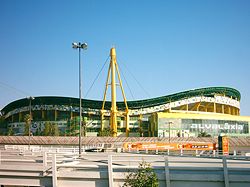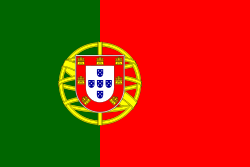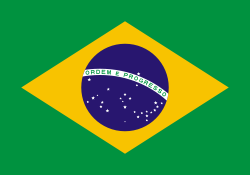Sporting Clube de Portugal
| Full name | Sporting Clube de Portugal | |||||||||||||||||||||||||||||||||||||||
|---|---|---|---|---|---|---|---|---|---|---|---|---|---|---|---|---|---|---|---|---|---|---|---|---|---|---|---|---|---|---|---|---|---|---|---|---|---|---|---|---|
| Nickname(s) | Leões (Lions) | |||||||||||||||||||||||||||||||||||||||
| Founded | 1 July1906 | |||||||||||||||||||||||||||||||||||||||
| Ground | Estádio José Alvalade (Capacity: 50,466) |
|||||||||||||||||||||||||||||||||||||||
| Chairman | ||||||||||||||||||||||||||||||||||||||||
| Manager | ||||||||||||||||||||||||||||||||||||||||
| League | Portuguese Liga | |||||||||||||||||||||||||||||||||||||||
| 2007–08 | Portuguese Liga, 2nd | |||||||||||||||||||||||||||||||||||||||
|
||||||||||||||||||||||||||||||||||||||||
Sporting Clube de Portugal (pron. IPA: ['spɔɾtĩg 'klub(ɨ) dɨ puɾtu'gaɫ], referred to coloquially as Sporting, Sporting CP or, erroneously, Sporting Lisbon, is a Portuguese sports club based in Lisbon. The club is particularly renowned for its football department. With more than 100,000 registered club members[1], Sporting is one of the most successful and popular sports clubs in Portugal. Its teams, athletes and supporters are often nicknamed Os Leões (English: The Lions).
Along with Benfica and FC Porto, Sporting is one of "The Big Three" sports clubs in Portugal. It is the club with the greatest number of medals won by its athletes in Olympic competitions, and the second most successful at the European level regarding the number of trophies won in every sport, after F.C. Barcelona.
Contents |
History
The club's foundation was instigated by José Holtreman Roquette (José of Alvalade), with the financial support of his grandfather, Alfredo Augusto das Neves Holtreman, Viscount of Alvalade. The Viscount of Alvalade was the first President of Sporting Clube de Portugal. The club was established in 1902 as Sport Club de Belas, which became Campo Grande Sporting Club in 1904, and took its definitive name of Sporting Clube de Portugal in 1906.
Name
Within Portugal, the Sporting Clube de Portugal is often referred to simply as "Sporting". Outside Portugal, the most commonly used designation for the club is "Sporting Lisbon" erroneously though. In the past the club has attempted (unsuccessfully) to shed this name, particularly through ex-president Sousa Cintra and his staff, in an effort to become known abroad by its correct name. Despite this, the non-Portuguese media still uses Sporting Lisbon (or equivalent) due to precedent (other accepted examples of English language alterations being Inter Milan, AC Milan and Bayern Munich) and to avoid confusion with other clubs such as Sporting Braga, Sporting Covilhã, Sporting Farense and Sporting Gijón, instead of using a more accurate name like Sporting Portugal.
Organization
Sporting is a multisports club, composed by many different competitive departments, including football, futsal, athletics and handball, among others. The football department is the largest in terms of budget and popularity. The other sports departments of the club (the ranks of which include Olympic winners and World Champions) are managed by specialized professionals according to each sport's specificity and have their own decision making bodies.
Football
Football is the most popular sport in Portugal and the Portuguese Football League the most important sports championship, where the top teams earn a place in the most demanding and profitable European football competitions - the European Champions League and the UEFA Cup. The club's football team has won 18 national championship titles, 15 national cups and the former Cup Winners' Cup in 1964.
Sporting has been a major contender in the Portuguese League since its inception. The club's football department has developed an increasingly professionalized profile which operates in an increasingly competitive environment in both Portugal and Europe. In 1998, the football department of the club was reorganized into a company and issued stock on the market. Since then Sporting - Sociedade Desportiva de Futebol, S.A.D. is a publicly traded company which is listed on the Euronext Lisbon stock exchange.
Facilities
Stadium

Sporting boasts a new stadium, Estádio José Alvalade, built for the 2004 European Football Championship. Sporting also has a world-class football training facility (Academia Sporting in Alcochete), which accommodated Portugal during the Euro 2004 competition, and has helped to produce some of the best Portuguese players, such as Luís Figo, Luís Nani, Cristiano Ronaldo and Ricardo Quaresma, among many others.
It was designed by Tomás Taveira and was classified by UEFA as a 5-star stadium, enabling it to host finals of major UEFA events. This stadium - originally projected to hold only 40,000 spectators at any given time - has a capacity of 52,000 and was acoustically engineered as a venue for major concerts. Its official opening was on 6 August2003 when Sporting played and beat Manchester United 3-1. It also hosted the 2005 UEFA Cup final between Sporting and CSKA Moscow, which CSKA won 3-1.
The stadium was also one of the stadia that hosted matches during Euro 2004. There were five games played in Estádio José Alvalade, one of them being the semi-final between Portugal and The Netherlands, which Portugal won 2-1.
Sporting's youth academy
Famous for its football youth academy system which features a range of well-equipped facilities and is one of the most renowned in the world, Sporting has continuously developed many world class footballers. Some of its most notable home-bred footballers include João Moutinho, Miguel Veloso, Yannick Djaló, Bruno Pereirinha, Rui Patrício, Adrien Silva, Daniel Carriço and Marco Caneira in the current squad, Paulo Futre (retired), Luís Figo (Inter Milan), Cristiano Ronaldo and Nani (Manchester United), as well as Luis Boa Morte (West Ham United). The long list of valuable players who developed their skills in the youth academy of the club, include other noted footballers such as Dani Carvalho (retired) who played for Ajax Amsterdam, former FC Barcelona player Ricardo Quaresma (who joined Inter Milan in 2008), Simão Sabrosa (Atlético de Madrid), Hugo Viana (Valencia) and Miguel (Valencia, although he only played for the youth squads, before moving to Estrela da Amadora). Sporting's youth academy was considered by Luiz Felipe Scolari (was Portugal's national coach, now Manages Chelsea FC) and José Pekerman (former Argentina national coach) as one of the best sports academies in the world. It was also the home training ground for the Portuguese national football team during Euro 2004. A great number of European clubs choose the Sporting's Academia for training in the off-season.
The Academy (known as the Academia de Alcochete) has been renamed Sporting/Puma Academy (Academia Sporting/Puma) to reflect the sponsoring and naming contract signed by the club and the sports brand Puma in 2006; the contract will last until 2012.
Honours
- Winners: (18) 1940–41 1943–44 1946–47 1947–48 1948–49 1950–51 1951–52 1952–53 1953–54 1957–58 1961–62 1965–66 1969–70 1973–74 1979–80 1981–82 1999–2000 2001–02
- Runners-up: (19) 1934–35 1938–39 1939–40 1941–42 1942–43 1944–45 1949–50 1959–60 1960–61 1967–68 1968–69 1970–71 1976–77 1984–85 1994–95 1996–97 2005–06 2006–07 2007–08
Cup of Portugal
- Winners: (19) 1922–23 1933–34 1935–36 1937–38 1940–41 1944–45 1945–46 1947–48 1953–54 1962–63 1970–71 1972–73 1973–74 1977–78 1981–82 1994–95 2001–02 2006–07 2007–08
- Runners-up: (16) 1922 1925 1928 1933 1935 1937 1952 1955 1960 1970 1972 1979 1987 1994 1996 2000
Portuguese League Cup
- Runners-up: 2008
SuperCup Cândido de Oliveira
- Winners: (7) 1982 1987 1995 2000 2002 2007 2008
- Runners-up: (1) 1980
- Winners: (1) 1964
- Runners-up: (1) 2005
League and Cup History
- Further information: Sporting Clube de Portugal statistics
Current squad
|
|
Players with double Nationality

 Adrien Silva
Adrien Silva
 Cédric Soares
Cédric Soares
 Yannick Djaló
Yannick Djaló
 Derlei
Derlei
Out on loan
|
|
Young squads
For the young squads, see Young Squads.
Notable players
- See Cat:Sporting Clube de Portugal footballers.
Other sports
Like many Portuguese sports clubs, Sporting fields teams and supports athletes in many events other than football, among them athletics (members include world-class athlete Carlos Lopes, Olympic Marathon Gold Medal in Los Angeles 84, Rui Silva, Naide Gomes and Francis Obikwelu), swimming, handball, table tennis, beach soccer, and futsal. Sporting's athletics department and the futsal team are especially notable. Sporting's futsal has won the league for 7 times out of 16 FPF sponsored tournaments.
Sporting Clube de Portugal's active sports departments besides the football department include:
Archery
- Various types, adding up, amounts to more than 50 national titles and 2 European titles
Athletics
- There are various titles in this sport but in the major ones, Sporting has almost 300 national titles and more than 30 European titles (1 time European champion)
Billiards
- 36 individual national titles
- 15 doubles national titles
- 2 individual Cups of Portugal
- 4 doubles Cups of Portugal
+ 100 titles in various types of billiards (Feminine, etc.)
Boxing
- There are various types because of the age and weight but adding up the major titles, Sporting has more than 100 national titles.
Chess
- 14 national titles and more than 20 in other variances of chess.
Full contact karate
- 14 national titles
- 1 Intercontinenatal Championship
- 3 European Champion
- 1 World Champion
Futsal
- 7 League titles
- 2 Cups of Portugal
- 1 National Cup (extinct)
- 3 Portuguese Super Cups
Gymnastics
- Sporting has more than 150 national titles, in the various types of gymnastics and 11 European titles.
Handball
- 19 times National Champions: 2 Elite Division titles and 17 League titles
- 12 Cups of Portugal
- 2 Portuguese Super Cups
Shooting
- 18 individual titles
- 12 team titles
+ 50 other variances titles
Swimming
- There are various competitions, in general Sporting has more than 150 national titles and 3 European titles
Table tennis
- + 50 League titles (11 in a row record)
- 3 Portuguese/Spanish vs American Competition
- 3 times Bronze Medal in European Championships
Taekwondo
- In taekwondo, Sporting has performed almost like Boxing but adding up, Sporting has more than 50 national titles.
Weight-lifting
- 16 national titles
Chairmen
- Alfredo Augusto das Neves Holtreman
- João Rocha
- Sousa Cintra
- José Roquette
- Pedro Santana Lopes
- António Dias da Cunha
- Filipe Soares Franco (current chairman)
Supporters
Being one of the most popular teams in Portugal, Sporting Clube de Portugal is among the Portuguese clubs with more house clubs (houses that represent the club in a particular region in Portugal or outside the country), Sporting has more than 200 official houses and more than 90,000 club members.
Organised fan groups:
- Juventude Leonina - The biggest and oldest supporters group in Portugal founded by the sons of a former Sporting president in 1976, having more than 3,000 members.
- Directivo Ultras XXI - Formed by a former leader of Juve Leo regarding an internal problem that is now healed. One of the biggest supporters group in Portugal with almost 2,000 members.
- Torcida Verde - Second oldest supporters group of Sporting, formed in 1984, Torcida Verde is very well known because of their demonstrations against alleged corruption in Portuguese football and by supporting the less visible sports of Sporting.
References
- ↑ (Portuguese) Pedro Jorge da Cunha - Finanças do futebol, 5th May 2006 - MaisFutebol
External links
- Official website:
- Official site (Portuguese)
- Official Himn (Portuguese)
- Official supporters websites:
- Other unofficial websites:
- Portal Sporting (Portuguese)
- Fórum SCP The independent internet forum community of Sporting Lisbon (Portuguese)
- Wiki Fórum SCP Everything you always wanted to know about Sporting
- Portuguesefutebol.com Portuguese football in English
- Tudo sobre Sporting (Portuguese)
- Fan site (Portuguese)
- Sporting Clube de Portugal Database
- Polish page fans Sporting Clube de Portugal
|
Sporting Clube de Portugal
|
|||||||||||||||||||||||||||||||||||||||
|---|---|---|---|---|---|---|---|---|---|---|---|---|---|---|---|---|---|---|---|---|---|---|---|---|---|---|---|---|---|---|---|---|---|---|---|---|---|---|---|
|
|||||||||||||||||||||||||||||||||||||||
|
|||||||||||||||||||||||||||||||||||||||
|
|||||||||||||||||||||||||||||||||||||||
|
Football in Portugal
|
|||||||||||||||||||||||||||||||||||||||
|
|||||||||||||||||||||||||||||||||||||||
|
|||||||||||||||||||||||||||||||||||||||